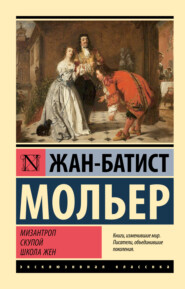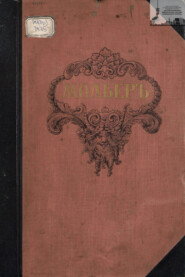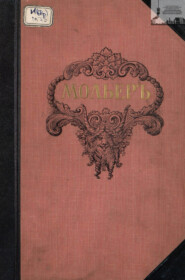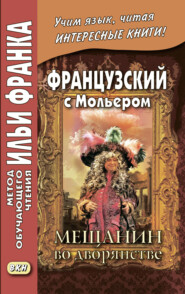По всем вопросам обращайтесь на: info@litportal.ru
(©) 2003-2024.
✖
Don Garcia of Navarre; Or, the Jealous Prince
Год написания книги
2017
Настройки чтения
Размер шрифта
Высота строк
Поля
Don Garcia of Navarre; Or, the Jealous Prince
Жан-Батист Мольер
Molière
Don Garcia of Navarre; Or, the Jealous Prince. A Heroic Comedy in Five Acts
INTRODUCTORY NOTICE
Nothing can be more unlike The Pretentious Young Ladies or Sganarelle than Molière's Don Garcia of Navarre. The Théâtre du Palais-Royal had opened on the 20th January, 1661, with The Love-Tiff and Sganarelle, but as the young wife of Louis XIV., Maria Theresa, daughter of Philip IV., King of Spain, had only lately arrived, and as a taste for the Spanish drama appeared to spring up anew in France, Molière thought perhaps that a heroic comedy in that style might meet with some success, the more so as a company of Spanish actors had been performing in Paris the plays of Lope de Vega and Calderon, since the 24th of July, 1660. Therefore, he brought out, on the 4th of February, 1661, his new play of Don Garcia of Navarre. It is said that there exists a Spanish play of the same name, of which the author is unknown; Molière seems to have partly followed an Italian comedy, written by Giacinto Andrea Cicognini, under the name of Le Gelosie fortunata del principe Rodrigo; the style, loftiness and delicacy of expression are peculiar to the French dramatist.
Don Garcia of Navarre met with no favourable reception, though the author played the part of the hero. He withdrew it after five representations, but still did not think its condemnation final, for he played it again before the King on the 29th of September, 1662, in October, 1663, at Chantilly, and twice at Versailles. He attempted it anew on the theatre of the Palace-Royal in the month of November, 1663; but as it was everywhere unfavourably received, he resolved never to play it more, and even would not print it, for it was only published after his death in 1682. He inserted some parts of this comedy in the Misanthrope, the Femmes Savantes, Amphitryon, Tartuffe and _Les Fâcheux, where they produced great effect.
Though it has not gained a place on the French stage, it nevertheless possesses some fine passages. Molière wished to create a counterpart of Sganarelle, the type of ridiculous jealousy, and to delineate passionate jealousy, its doubts, fears, perplexities and anxieties, and in this he has succeeded admirably. However noble-minded Don Garcia may be, there rages within his soul a mean passion which tortures and degrades him incessantly. When at last he is banished from the presence of the fair object of his love, he resolves to brave death by devoting himself to the destruction of her foe; but he is forestalled by his presumed rival, Don Alphonso, who turns out to be the brother of his mistress, and she receives him once again and for ever in her favour. The delineation of all these passions is too fine-spun, too argumentative to please the general public; the style is sometimes stilted, yet passages of great beauty may be found in it. Moreover the jealousy expressed by Don Garcia is neither sufficiently terrible to frighten, nor ridiculous enough to amuse the audience; he always speaks and acts as a prince, and hence, he sometimes becomes royally monotonous.
Some scenes of this play have been imitated in The Masquerade, a comedy, acted at the Theatre Royal, Drury Lane, 1719, London, "printed for Bernard Linton, between the Temple Gate," which was itself partly borrowed from Shirley's Lady of Pleasure. The comedy was written by Mr. Charles Johnson, who "was originally bred to the law, and was a member of the Middle Temple; but being a great admirer of the Muses, and finding in himself a strong propensity to dramatic writing, he quitted the studious labour of the one, for the more spirited amusements of the other; and by contracting an intimacy with Mr. Wilks, found means, through that gentleman's interest, to get his plays on the stage without much difficulty … he, by a polite and modest behaviour formed so extensive an acquaintance and intimacy, as constantly ensured him great emoluments on his benefit night by which means, being a man of economy, he was enabled to subsist very genteelly. He at length married a young widow, with a tolerable fortune; on which he set up a tavern in Bow Street, Covent Garden, but quitted business at his wife's death, and lived privately on an easy competence he had saved… He was born in 1679 … but he did not die till March 11, 1748." [Footnote: Biographia Dramatica, by Baker, Reed and Jones, 1812, Vol. I. Part i.]
The Masquerade is a clever comedy, rather free in language and thought, chiefly about the danger of gambling. Some of the sayings are very pointed. It has been stated that the author frequented the principal coffee-houses in town, and picked up many pungent remarks there; however this may be, the literary men who at the present time frequent clubs, have, I am afraid, not the same chance. As a specimen of free and easy – rather too easy – wit, let me mention the remarks of Mr. Smart (Act I.) on the way he passed the night, and in what manner. "Nine persons are kept handsomely out of the sober income of one hundred pounds a year." I also observe the name of an old acquaintance in this play. Thackeray's hero in the Memoirs of Mr. Charles J. Yellowplush is "the Honourable Algernon Percy Deuceace, youngest and fifth son of the Earl of Crabs," and in The Masquerade (Act III. Sc. i) Mr. Ombre says: "Did you not observe an old decay'd rake that stood next the box-keeper yonder … they call him Sir Timothy Deuxace; that wretch has play'd off one of the best families in Europe – he has thrown away all his posterity, and reduced 20,000 acres of wood-land, arable, meadow, and pasture within the narrow circumference of an oaken table of eight foot." The Masquerade as the title of the play is a misnomer, for it does not conduce at all to the plot. We give the greater part of the Prologue to The Masquerade, spoken by Mr. Wilks: —
The Poet, who must paint by Nature's Laws,
If he wou'd merit what he begs, Applause;
Surveys your changing Pleasures with Surprise,
Sees each new Day some new Diversion rise;
Hither, thro' all the Quarters of the Sky,
Fresh Rooks in Flocks from ev'ry Nation hye,
To us, the Cullies of the Globe, they fly;
French, Spaniards, Switzers; This Man dines on Fire
And swallows Brimstone to your Heart's Desire;
Another, Handless, Footless, Half a Man,
Does, Wou'd you think it? what no Whole one can,
A Spaniard next, taught an Italian Frown,
Boldly declares he'll stare all Europe down:
His tortured Muscles pleas'd our English Fools;
[Footnote: In the rival House, Lincoln's-Inn-Fields Theatre, Rich was bringing out Pantomimes, which, by the fertility of his invention, the excellency of his own performance, and the introduction of foreign performers, drew nightly crowded houses – hence the allusion.]
Why wou'd the Sot engage with English Bulls?
Our English Bulls are Hereticks uncivil,
They'd toss the Grand Inquisitor, the Devil:
'Twas stupidly contrived of Don Grimace,
To hope to fright 'em with an ugly Face.
And yet, tho' these Exotick Monsters please,
We must with humble Gratitude confess,
To you alone 'tis due, that in this Age,
Good Sense still triumphs on the British Stage:
Shakespear beholds with Joy his Sons inherit
His good old Plays, with good old Bess's Spirit.
Be wise and merry, while you keep that Tether;
Nonsense and Slavery must die together.
DRAMATIS PERSONÆ
DON GARCIA, Prince of Navarre, in love with Elvira.
[Footnote: In the inventory taken after Molière's death mention is made of "Spanish dress, breeches, cloth cloak, and a satin doublet, the whole adorned with silk embroideries." This is probably the dress in which Molière played Don Garcia.]
DON ALPHONSO, Prince of Leon, thought to be Prince of Castile, under the name of Don Silvio.
DON ALVAREZ, confidant of Don Garcia, in love with Eliza.
DON LOPEZ, another confidant of Don Garcia, in love with Eliza.
DON PEDRO, gentleman usher to Inez.
A PAGE.
DONNA ELVIRA, Princess of Leon.
DONNA INEZ, a Countess, in love with Don Silvio, beloved by Mauregat, the usurper of the Kingdom of Leon.
ELIZA, confidant to Elvira.
Scene. – ASTORGA, a city of Spain, in the kingdom of Leon.
ACT I
SCENE I. – DONNA ELVIRA, ELIZA
ELVIRA. No, the hidden feelings of my heart were not regulated by choice: whatever the Prince may be, there is nothing in him to make me prefer his love. Don Silvio shows, as well as he, all the qualities of a renowned hero. The same noble virtues and the same high birth made me hesitate whom to prefer. If aught but merit could gain my heart, the conqueror were yet to be named; but these chains, with which Heaven keeps our souls enslaved, decide me, and, though I esteem both equally, my love is given to Don Garcia.
ELIZA. The love which you feel for him, seems to have very little influenced your actions, since I, myself, madam, could not for a long time discover which of the two rivals was the favoured one.
ELV. Their noble rivalry in love, Eliza, caused a severe struggle in my breast. When I looked on the one, I felt no pangs, because I followed my own tender inclination; but when I thought I sacrificed the other, I considered I acted very unjustly; and was of opinion, that Don Silvio's passion, after all, deserved a happier destiny. I also reflected that a daughter of the late King of Leon owed some obligation to the house of Castile; that an intimate friendship had long knit together the interests of his father and mine. Thus, the more the one made progress in my heart, the more I lamented the ill success of the other. Full of pity, I listened to his ardent sighs, and received his vows politely; thus in a slight degree I tried to make amends for the opposition his love met with in my heart.
EL. But since you have been informed he previously loved another, your mind ought to be at rest. Before he loved you, Donna Inez had received the homage of his heart. As she is your most intimate friend, and has told you this secret, you are free to bestow your love upon whom you wish, and cover your refusal to listen to him under the guise of friendship for her.
ELV. It is true, I ought to be pleased with the news of Don Silvio's faithlessness, because my heart, that was tormented by his love, is now at liberty to reject it; can justly refuse his addresses, and, without scruple, grant its favours to another. But what delight can my heart feel, if it suffers severely from other pangs; if the continual weakness of a jealous prince receives my tenderness with disdain, compels me justly to give way to anger, and thus to break off all intercourse between us?
EL. But as he has never been told that you love him, how can he be guilty if he disbelieves in his happiness? And does not that which could flatter his rival's expectations warrant him to suspect your affection?
ELV. No, no; nothing can excuse the strange madness of his gloomy and unmanly jealousy; I have told him but too clearly, by my actions, that he can indeed flatter himself with the happiness of being beloved. Even if we do not speak, there are other interpreters which clearly lay bare our secret feelings. A sigh, a glance, a mere blush, silence itself, is enough to show the impulses of a heart. In love, everything speaks: in a case like this, the smallest glimmer ought to throw a great light upon such a subject, since the honour which sways our sex forbids us ever to discover all we feel. I have, I own, endeavoured so to guide my conduct, that I should behold their merits with an unprejudiced eye. But how vainly do we strive against our inclinations! How easy is it to perceive the difference between those favours that are bestowed out of mere politeness, and such as spring from the heart! The first seem always forced; the latter, alas! are granted without thinking, like those pure and limpid streams which spontaneously flow from their native sources. Though the feelings of pity I showed for Don Silvio moved the Prince, yet I unwittingly betrayed their shallowness, whilst my very looks, during this torture, always told him more than I desired they should.
EL. Though the suspicions of that illustrious lover have no foundation – for you tell me so – they at least prove that he is greatly smitten: some would rejoice at what you complain of. Jealousy may be odious when it proceeds from a love which displeases us; but when we return that love, such feelings should delight us. It is the best way in which a lover can express his passion; the more jealous he is the more we ought to love him. Therefore since in your soul a magnanimous Prince…
ELV. Ah! do not bring forward such a strange maxim. Jealousy is always odious and monstrous; nothing can soften its injurious attacks; the dearer the object of our love is to us, the more deeply we feel its offensive attempts. To see a passionate Prince, losing every moment that respect with which love inspires its real votaries; to see him, when his whole mind is a prey to jealousy, finding fault either with what I like or dislike, and explaining every look of mine in favour of a rival!
[Footnote: Molière has expressed the same thoughts differently in TheBores, Act ii. scene 4.]
No, no! such suspicions are too insulting, and I tell you my thoughts without disguise. I love Don Garcia; he alone can fascinate a generous heart; his courage in Leon has nobly proved his passion for me; he dared on my account the greatest dangers, freed me from the toils of cowardly tyrants, and protected me against the horrors of an unworthy alliance by placing me within these strong walls. Nor will I deny but that I should have regretted that I owed my deliverance to any other; for an enamoured heart feels an extreme pleasure, Eliza, in being under some obligations to the object beloved; its faint flame becomes stronger and brighter when it thinks it can discharge them by granting some favours. Yes, I am charmed that he assisted me and risked his life for me, for this seems to give his passion a right of conquest; I rejoice that the danger I was in threw me into his hands. If common reports be true, and Heaven should grant my brother's return, I wish fervently, and with all my heart, that his arm may aid my brother to recover his throne, and punish a traitor; that his heroic valour may be successful, and thus deserve my brother's utmost gratitude. But for all this, if he continues to rouse my anger; if he does not lay aside his jealousy, and obey me in whatever I command, he in vain aspires to the hand of Donna Elvira. Marriage can never unite us; for I abhor bonds, which, undoubtedly, would then make a hell upon earth for both of us.
Жан-Батист Мольер
Molière
Don Garcia of Navarre; Or, the Jealous Prince. A Heroic Comedy in Five Acts
INTRODUCTORY NOTICE
Nothing can be more unlike The Pretentious Young Ladies or Sganarelle than Molière's Don Garcia of Navarre. The Théâtre du Palais-Royal had opened on the 20th January, 1661, with The Love-Tiff and Sganarelle, but as the young wife of Louis XIV., Maria Theresa, daughter of Philip IV., King of Spain, had only lately arrived, and as a taste for the Spanish drama appeared to spring up anew in France, Molière thought perhaps that a heroic comedy in that style might meet with some success, the more so as a company of Spanish actors had been performing in Paris the plays of Lope de Vega and Calderon, since the 24th of July, 1660. Therefore, he brought out, on the 4th of February, 1661, his new play of Don Garcia of Navarre. It is said that there exists a Spanish play of the same name, of which the author is unknown; Molière seems to have partly followed an Italian comedy, written by Giacinto Andrea Cicognini, under the name of Le Gelosie fortunata del principe Rodrigo; the style, loftiness and delicacy of expression are peculiar to the French dramatist.
Don Garcia of Navarre met with no favourable reception, though the author played the part of the hero. He withdrew it after five representations, but still did not think its condemnation final, for he played it again before the King on the 29th of September, 1662, in October, 1663, at Chantilly, and twice at Versailles. He attempted it anew on the theatre of the Palace-Royal in the month of November, 1663; but as it was everywhere unfavourably received, he resolved never to play it more, and even would not print it, for it was only published after his death in 1682. He inserted some parts of this comedy in the Misanthrope, the Femmes Savantes, Amphitryon, Tartuffe and _Les Fâcheux, where they produced great effect.
Though it has not gained a place on the French stage, it nevertheless possesses some fine passages. Molière wished to create a counterpart of Sganarelle, the type of ridiculous jealousy, and to delineate passionate jealousy, its doubts, fears, perplexities and anxieties, and in this he has succeeded admirably. However noble-minded Don Garcia may be, there rages within his soul a mean passion which tortures and degrades him incessantly. When at last he is banished from the presence of the fair object of his love, he resolves to brave death by devoting himself to the destruction of her foe; but he is forestalled by his presumed rival, Don Alphonso, who turns out to be the brother of his mistress, and she receives him once again and for ever in her favour. The delineation of all these passions is too fine-spun, too argumentative to please the general public; the style is sometimes stilted, yet passages of great beauty may be found in it. Moreover the jealousy expressed by Don Garcia is neither sufficiently terrible to frighten, nor ridiculous enough to amuse the audience; he always speaks and acts as a prince, and hence, he sometimes becomes royally monotonous.
Some scenes of this play have been imitated in The Masquerade, a comedy, acted at the Theatre Royal, Drury Lane, 1719, London, "printed for Bernard Linton, between the Temple Gate," which was itself partly borrowed from Shirley's Lady of Pleasure. The comedy was written by Mr. Charles Johnson, who "was originally bred to the law, and was a member of the Middle Temple; but being a great admirer of the Muses, and finding in himself a strong propensity to dramatic writing, he quitted the studious labour of the one, for the more spirited amusements of the other; and by contracting an intimacy with Mr. Wilks, found means, through that gentleman's interest, to get his plays on the stage without much difficulty … he, by a polite and modest behaviour formed so extensive an acquaintance and intimacy, as constantly ensured him great emoluments on his benefit night by which means, being a man of economy, he was enabled to subsist very genteelly. He at length married a young widow, with a tolerable fortune; on which he set up a tavern in Bow Street, Covent Garden, but quitted business at his wife's death, and lived privately on an easy competence he had saved… He was born in 1679 … but he did not die till March 11, 1748." [Footnote: Biographia Dramatica, by Baker, Reed and Jones, 1812, Vol. I. Part i.]
The Masquerade is a clever comedy, rather free in language and thought, chiefly about the danger of gambling. Some of the sayings are very pointed. It has been stated that the author frequented the principal coffee-houses in town, and picked up many pungent remarks there; however this may be, the literary men who at the present time frequent clubs, have, I am afraid, not the same chance. As a specimen of free and easy – rather too easy – wit, let me mention the remarks of Mr. Smart (Act I.) on the way he passed the night, and in what manner. "Nine persons are kept handsomely out of the sober income of one hundred pounds a year." I also observe the name of an old acquaintance in this play. Thackeray's hero in the Memoirs of Mr. Charles J. Yellowplush is "the Honourable Algernon Percy Deuceace, youngest and fifth son of the Earl of Crabs," and in The Masquerade (Act III. Sc. i) Mr. Ombre says: "Did you not observe an old decay'd rake that stood next the box-keeper yonder … they call him Sir Timothy Deuxace; that wretch has play'd off one of the best families in Europe – he has thrown away all his posterity, and reduced 20,000 acres of wood-land, arable, meadow, and pasture within the narrow circumference of an oaken table of eight foot." The Masquerade as the title of the play is a misnomer, for it does not conduce at all to the plot. We give the greater part of the Prologue to The Masquerade, spoken by Mr. Wilks: —
The Poet, who must paint by Nature's Laws,
If he wou'd merit what he begs, Applause;
Surveys your changing Pleasures with Surprise,
Sees each new Day some new Diversion rise;
Hither, thro' all the Quarters of the Sky,
Fresh Rooks in Flocks from ev'ry Nation hye,
To us, the Cullies of the Globe, they fly;
French, Spaniards, Switzers; This Man dines on Fire
And swallows Brimstone to your Heart's Desire;
Another, Handless, Footless, Half a Man,
Does, Wou'd you think it? what no Whole one can,
A Spaniard next, taught an Italian Frown,
Boldly declares he'll stare all Europe down:
His tortured Muscles pleas'd our English Fools;
[Footnote: In the rival House, Lincoln's-Inn-Fields Theatre, Rich was bringing out Pantomimes, which, by the fertility of his invention, the excellency of his own performance, and the introduction of foreign performers, drew nightly crowded houses – hence the allusion.]
Why wou'd the Sot engage with English Bulls?
Our English Bulls are Hereticks uncivil,
They'd toss the Grand Inquisitor, the Devil:
'Twas stupidly contrived of Don Grimace,
To hope to fright 'em with an ugly Face.
And yet, tho' these Exotick Monsters please,
We must with humble Gratitude confess,
To you alone 'tis due, that in this Age,
Good Sense still triumphs on the British Stage:
Shakespear beholds with Joy his Sons inherit
His good old Plays, with good old Bess's Spirit.
Be wise and merry, while you keep that Tether;
Nonsense and Slavery must die together.
DRAMATIS PERSONÆ
DON GARCIA, Prince of Navarre, in love with Elvira.
[Footnote: In the inventory taken after Molière's death mention is made of "Spanish dress, breeches, cloth cloak, and a satin doublet, the whole adorned with silk embroideries." This is probably the dress in which Molière played Don Garcia.]
DON ALPHONSO, Prince of Leon, thought to be Prince of Castile, under the name of Don Silvio.
DON ALVAREZ, confidant of Don Garcia, in love with Eliza.
DON LOPEZ, another confidant of Don Garcia, in love with Eliza.
DON PEDRO, gentleman usher to Inez.
A PAGE.
DONNA ELVIRA, Princess of Leon.
DONNA INEZ, a Countess, in love with Don Silvio, beloved by Mauregat, the usurper of the Kingdom of Leon.
ELIZA, confidant to Elvira.
Scene. – ASTORGA, a city of Spain, in the kingdom of Leon.
ACT I
SCENE I. – DONNA ELVIRA, ELIZA
ELVIRA. No, the hidden feelings of my heart were not regulated by choice: whatever the Prince may be, there is nothing in him to make me prefer his love. Don Silvio shows, as well as he, all the qualities of a renowned hero. The same noble virtues and the same high birth made me hesitate whom to prefer. If aught but merit could gain my heart, the conqueror were yet to be named; but these chains, with which Heaven keeps our souls enslaved, decide me, and, though I esteem both equally, my love is given to Don Garcia.
ELIZA. The love which you feel for him, seems to have very little influenced your actions, since I, myself, madam, could not for a long time discover which of the two rivals was the favoured one.
ELV. Their noble rivalry in love, Eliza, caused a severe struggle in my breast. When I looked on the one, I felt no pangs, because I followed my own tender inclination; but when I thought I sacrificed the other, I considered I acted very unjustly; and was of opinion, that Don Silvio's passion, after all, deserved a happier destiny. I also reflected that a daughter of the late King of Leon owed some obligation to the house of Castile; that an intimate friendship had long knit together the interests of his father and mine. Thus, the more the one made progress in my heart, the more I lamented the ill success of the other. Full of pity, I listened to his ardent sighs, and received his vows politely; thus in a slight degree I tried to make amends for the opposition his love met with in my heart.
EL. But since you have been informed he previously loved another, your mind ought to be at rest. Before he loved you, Donna Inez had received the homage of his heart. As she is your most intimate friend, and has told you this secret, you are free to bestow your love upon whom you wish, and cover your refusal to listen to him under the guise of friendship for her.
ELV. It is true, I ought to be pleased with the news of Don Silvio's faithlessness, because my heart, that was tormented by his love, is now at liberty to reject it; can justly refuse his addresses, and, without scruple, grant its favours to another. But what delight can my heart feel, if it suffers severely from other pangs; if the continual weakness of a jealous prince receives my tenderness with disdain, compels me justly to give way to anger, and thus to break off all intercourse between us?
EL. But as he has never been told that you love him, how can he be guilty if he disbelieves in his happiness? And does not that which could flatter his rival's expectations warrant him to suspect your affection?
ELV. No, no; nothing can excuse the strange madness of his gloomy and unmanly jealousy; I have told him but too clearly, by my actions, that he can indeed flatter himself with the happiness of being beloved. Even if we do not speak, there are other interpreters which clearly lay bare our secret feelings. A sigh, a glance, a mere blush, silence itself, is enough to show the impulses of a heart. In love, everything speaks: in a case like this, the smallest glimmer ought to throw a great light upon such a subject, since the honour which sways our sex forbids us ever to discover all we feel. I have, I own, endeavoured so to guide my conduct, that I should behold their merits with an unprejudiced eye. But how vainly do we strive against our inclinations! How easy is it to perceive the difference between those favours that are bestowed out of mere politeness, and such as spring from the heart! The first seem always forced; the latter, alas! are granted without thinking, like those pure and limpid streams which spontaneously flow from their native sources. Though the feelings of pity I showed for Don Silvio moved the Prince, yet I unwittingly betrayed their shallowness, whilst my very looks, during this torture, always told him more than I desired they should.
EL. Though the suspicions of that illustrious lover have no foundation – for you tell me so – they at least prove that he is greatly smitten: some would rejoice at what you complain of. Jealousy may be odious when it proceeds from a love which displeases us; but when we return that love, such feelings should delight us. It is the best way in which a lover can express his passion; the more jealous he is the more we ought to love him. Therefore since in your soul a magnanimous Prince…
ELV. Ah! do not bring forward such a strange maxim. Jealousy is always odious and monstrous; nothing can soften its injurious attacks; the dearer the object of our love is to us, the more deeply we feel its offensive attempts. To see a passionate Prince, losing every moment that respect with which love inspires its real votaries; to see him, when his whole mind is a prey to jealousy, finding fault either with what I like or dislike, and explaining every look of mine in favour of a rival!
[Footnote: Molière has expressed the same thoughts differently in TheBores, Act ii. scene 4.]
No, no! such suspicions are too insulting, and I tell you my thoughts without disguise. I love Don Garcia; he alone can fascinate a generous heart; his courage in Leon has nobly proved his passion for me; he dared on my account the greatest dangers, freed me from the toils of cowardly tyrants, and protected me against the horrors of an unworthy alliance by placing me within these strong walls. Nor will I deny but that I should have regretted that I owed my deliverance to any other; for an enamoured heart feels an extreme pleasure, Eliza, in being under some obligations to the object beloved; its faint flame becomes stronger and brighter when it thinks it can discharge them by granting some favours. Yes, I am charmed that he assisted me and risked his life for me, for this seems to give his passion a right of conquest; I rejoice that the danger I was in threw me into his hands. If common reports be true, and Heaven should grant my brother's return, I wish fervently, and with all my heart, that his arm may aid my brother to recover his throne, and punish a traitor; that his heroic valour may be successful, and thus deserve my brother's utmost gratitude. But for all this, if he continues to rouse my anger; if he does not lay aside his jealousy, and obey me in whatever I command, he in vain aspires to the hand of Donna Elvira. Marriage can never unite us; for I abhor bonds, which, undoubtedly, would then make a hell upon earth for both of us.

















